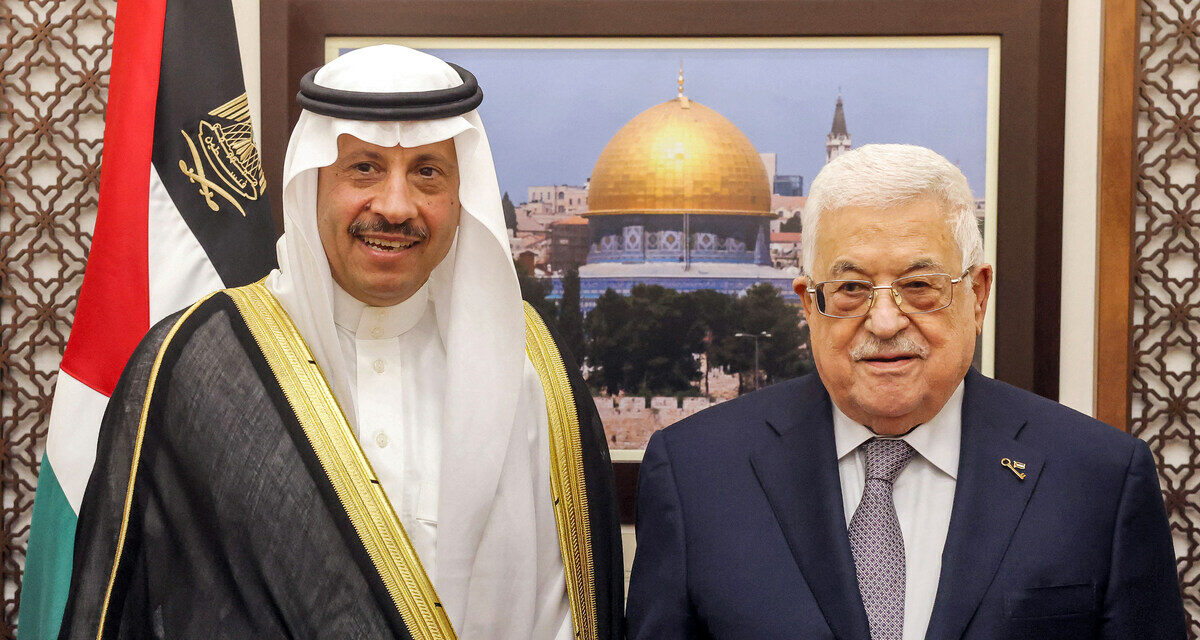Ramallah, Palestinian Territories– Saudi Arabia on Tuesday sent its first delegation in three decades to the occupied West Bank to reassure Palestinians it will defend their cause even as it forges closer ties with Israel.
In a sign of the thaw, Israel’s Tourism Minister Haim Katz visited Riyadh on the same day, for the first such high-level public mission to the oil-rich kingdom.
The United States has urged its Middle East allies Israel and Saudi Arabia to normalize diplomatic relations, following on from similar deals involving the United Arab Emirates, Bahrain and Morocco.
The Palestinians have labelled those agreements a betrayal of their plight and quest for statehood — but Nayef al-Sudairi, who headed the Saudi delegation, sought to reassure them Riyadh stands by their side.
“The Palestinian matter is a fundamental pillar,” Sudairi, the new non-resident ambassador to the Palestinians, said after meeting top Palestinian diplomat Riyad al-Maliki in Ramallah for talks and to present his credentials.
“And it’s certain that the Arab initiative, which was presented by the kingdom in 2002, is a cornerstone of any upcoming deal.”
The 2002 initiative proposed Arab relations with Israel in exchange for its withdrawal from the West Bank, east Jerusalem, Gaza and the Golan Heights, and a just resolution for the Palestinians.
Palestinian leader Mahmud Abbas, 87, last week again stressed strong reservations to Arab countries building ties with Israel.
“Those who think that peace can prevail in the Middle East without the Palestinian people enjoying their full, legitimate national rights would be mistaken,” Abbas told the UN General Assembly.
‘Negative consequences’
Sudairi’s delegation, which crossed overland from Jordan, was the first from Riyadh to visit the West Bank since the 1993 Oslo Accords, which had aimed to pave the way for an end to the Israeli-Palestinian conflict.
When asked whether there will be a Saudi embassy in Jerusalem, Sudairi recalled there used to be one in the east Jerusalem district of Sheikh Jarrah, and said that “hopefully there will be an embassy there” again.
Washington has been leading the talks between Israel and Saudi Arabia — the guardian of Islam’s two holiest sites — on a potential normalization widely seen as a political game-changer for the Middle East.
The talks have covered security guarantees for Saudi Arabia and assistance with a civilian nuclear program, according to officials familiar with the negotiations.
The Saudi crown prince and de facto ruler, Mohammed bin Salman, last week told US network Fox that the kingdom was getting “closer” to a deal with Israel but insisted the Palestinian cause remains “very important” for Riyadh.
Matt Duss of the Washington-based Centre for International Policy said any deal would have “negative consequences” for Palestinians.
“The argument of the Israeli right has always been that the Palestinian issue doesn’t matter, and that Israel can get whatever it wants without having to make any meaningful concessions to Palestinians,” he said.
“I think that’s the piece of it that would be affirmed” by the deal, Duss said in an online briefing.
In recent months Israel has sent delegations to Saudi Arabia, and on Tuesday Katz reached Riyadh to attend a UN World Tourism Organization event.
“I will act to create cooperation to advance tourism and Israel’s foreign relations,” he said in a statement.
‘Circle of peace’
Speaking at a ceremony Tuesday marking the 1973 Arab-Israeli war, Israeli Prime Minister Benjamin Netanyahu said “many states in the Middle East want peace with Israel”.
“Increasing the circle of peace is a historic opportunity and I’m committed to it.”
The Oslo Accords were meant to lead to an independent Palestinian state, but years of stalled negotiations and deadly violence have left any peaceful resolution a distant dream.
Netanyahu’s hard-right government has been expanding Israeli settlements in the West Bank which are deemed illegal under international law.
An escalation in violence has seen at least 242 Palestinians and 32 Israelis killed so far this year, according to official sources on both sides.
The United States, which has brokered talks between Israel and the Palestinians in the past, has made no major push toward a two-state solution since a failed effort nearly a decade ago.
Israel has occupied the West Bank since 1967 and later annexed east Jerusalem in a move not recognized internationally.
It also maintains a blockade on the Palestinian coastal territory of Gaza, where Israel launched drone strike Tuesday targeting a Hamas military post during a protest in which 11 Palestinians were wounded.

